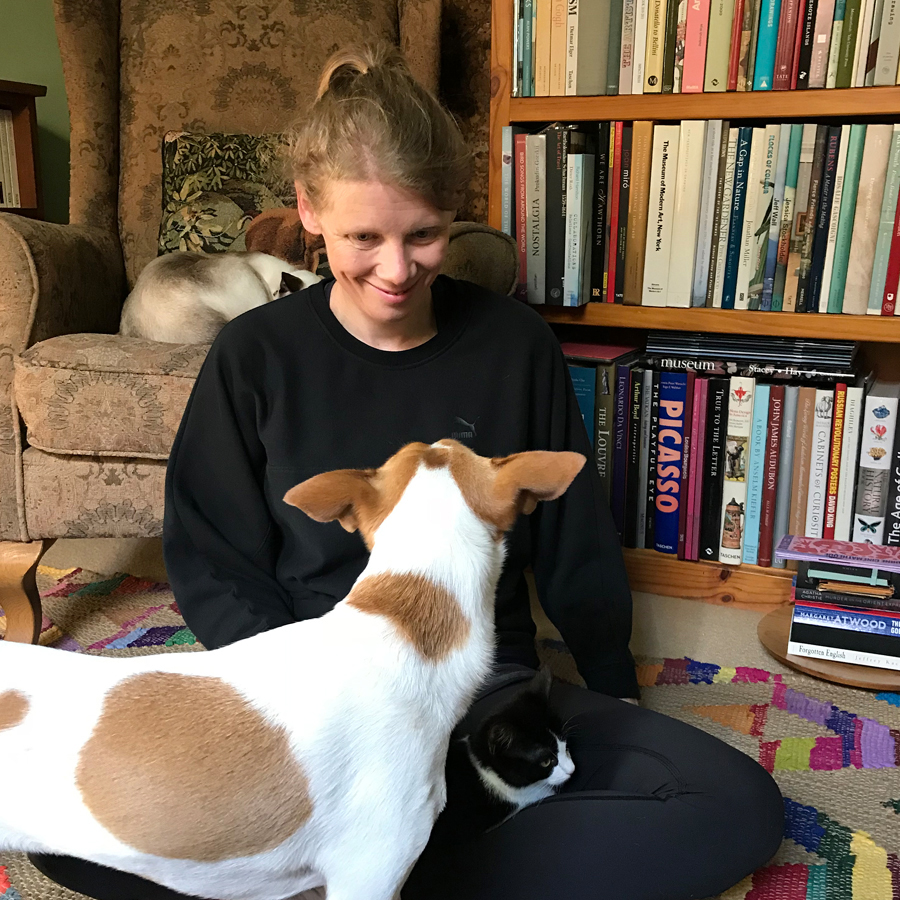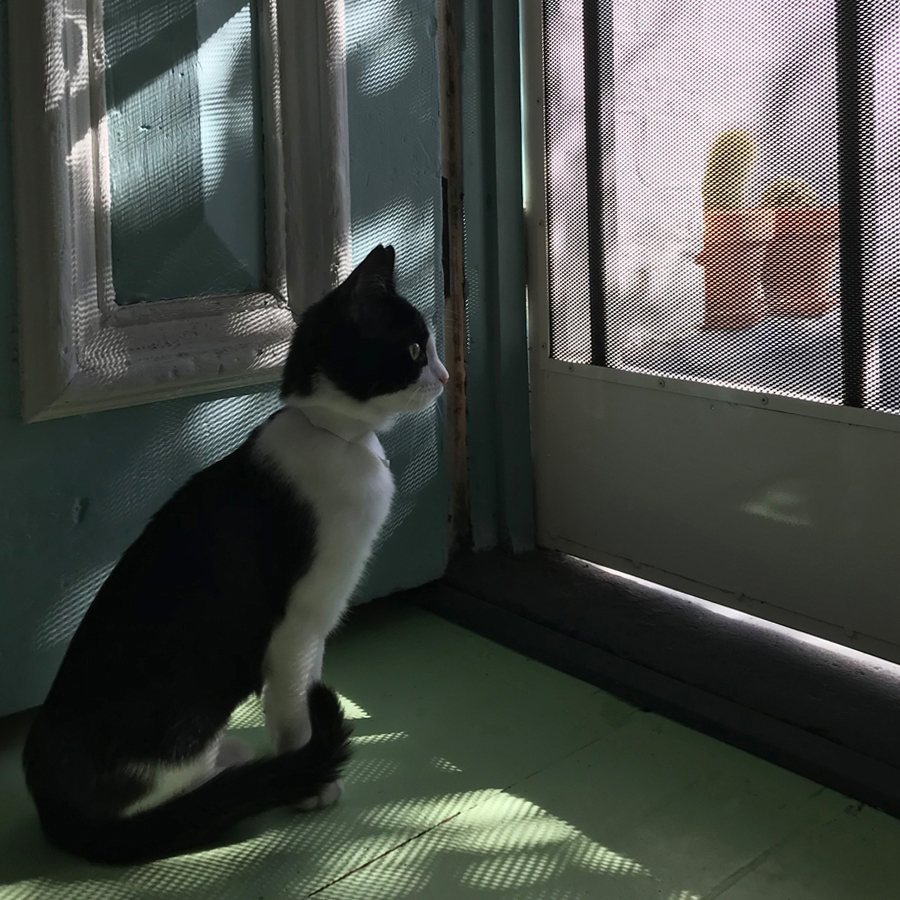Frida, mended

Foster care
RSPCA
One day I was counting the cats and I absent-mindedly counted myself.
― Bobbie Ann Mason, Shiloh and Other Stories
The animal that arrives in need of your care at the beginning and the animal that leaves your care at the end best sums up what foster care is. At the end of their time with you, for whatever the reason — post surgical care, recovery from injury or mistreatment or neglect, socialisation, timidity, possible allergies, or a mum with a litter of kittens — the animal you head back to the RSPCA shelter with is utterly different. Their coats might become glossier, their tummies rounder, their eyes brighter, their demeanour more confident (albeit not always in the initial return in a carrier; big challenges remain big challenges in anyone’s books). They are transformed, through time and love and care.
Frida arrived in our care late February, just 9-weeks-of-age, or so it was surmised. Her tiny collar listed her ID number, her date of admission, and the letters ‘FE’ (female entire). She was scheduled to have two operations while staying with us. We were to guide her through her period of convalescence. Recuperating Frida, our bathroom lodger. Frida, a name we were able to pick for her to wear. Frida, like the artist. And sometimes we’d call her Frida-Mouse, which sounded like Fledermaus, the bat of Johan Strauss II’s Die Fledermaus, owing to the pleasure of saying it, and her perfectly symmetrical bat-like mask (not the operetta’s theme of revenge). Her desexing procedure was scheduled for a fortnight from her arrival, and sometime after her recovery, her hind leg was to be amputated.
But on the day of her first operation she didn’t respond well to being anesthetised. She crashed, went blue; she very nearly didn’t make it. Possibly it was too much for her little body, being a kitten that we’ve no idea how she sustained her leg injury or what her background was. Possibly just a particular anaesthetic combination, which didn’t agree with her system and her system didn’t agree with in return, or a tiny bit of fluid in her lungs. With the clarity of hindsight, it was the best thing that could have happened to her for it meant her stay with us was longer.
She came back into our care and we set about making her strong and healthy. In her first week with us, we needed to administer soupy-food via a small syringe, along with her pain relief. Like other foster cats we have looked after, she proved a good patient. She sat on the kitchen scales to be weighed. She didn’t cower or fidget. Now, we needed to help her be the robust little kitten full of vim and vigour she ultimately became. When it came time for her desexing procedure the second time, with a different anaesthetic and in better shape, she soared through. She was flying about the house in no time, in pursuit of Lenni or Lottie, leaping upon them, nibbling them, playing with Lenni’s favourite string with Lottie holding the other end of it between her teeth, like some Lady and the Tramp spaghetti scene re-enactment on our lounge room floor. She loved to bite the back of Lottie’s legs or gnaw at her tail as Lottie tried to eat or sleep. Lottie and Lenni became Frida’s greatest amusement. Their every reverie interrupted by Frida chewing, licking, pawing at their ears, tails, legs. She was finally a kitten doing normal kitten things. She was no longer the quiet little soul with the face of an adult but a playful, chomping, leaping kitten. She was transforming under our very noses, and we all had the little playful scratch marks to show for it.
As she grew in confidence, she extended her exploration of the house. She still returned to the safety of her space in the bathroom, but more often she chose to be out in the house in the company of us all. She grew in strength and scaled furniture, pulling herself up with ease. She’d find high ground from which to launch an attack on your extremities and her bite was sharp. She’d curl up around your neck and fall asleep. She adapted quickly. As if made from kitten fibres fused with elastic. And eventually as her form evolved and her condition improved, we noticed that she wasn’t limping or sitting off to the side like a roly-poly tumbler. Where previously she would skittle to your feet, wobble as she sought orientation, and flop over like the self-righting toy, now she was using all four limbs equally. Her lower half, which had previously looked wasted away and fragile, was now looking stronger.
And stronger she was, inside as well as out. A preliminary x-ray before her scheduled amputation revealed her fracture had healed. There was no need to amputate! She stayed with us for another fortnight after receiving the good news (to see how she responded to being off pain medication), and she rarely stopped tearing from one end of the house to the other, save to flake on your lap, belly up, front paws crossed.
Yes, the little kitten we dropped off today to the East Burwood shelter was not the little kitten we first met two-months-ago. She is ready to fly. And we hope she does. Fly into the arms of a wonderful person looking for a tiny puss with bandit markings and a cheeky, determined disposition. Should that be you, please note, she is rather keen on popcorn and will steal a piece from your bowl before dragging it to her lair to devour. She has also just started to like chin rubs and pats behind the base of the ear. She trills when her favourite toy is stuck behind the fridge and she requires back up. She is great with (Lottie) dogs and keen to meet other cats.
Frida was a joy to have stay with us, and seeing her thrive is the reason we will continue to foster animals for the RSPCA. With the RSPCA, we’ve helped get her ready for take-off. This is why saying goodbye to her at the shelter is possible. We’ve got her ready for her next chapter, goggles fastened, world ahead. Fly, Frida, fly.
Frida (ID 889526) will be up for adoption shortly on the RSPCA website, from the East Burwood shelter, Victoria. Keep an eye on their site for her profile, and call in to meet her. She, or one of her neighbours, may be the perfect companion you are looking for.
Or if you are interested in becoming an RSPCA foster carer, register your interest and pop your name down for an information session.
Image credit: Lissák Tivadar, 1945











